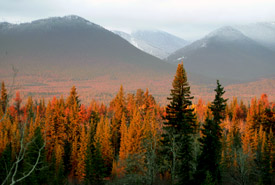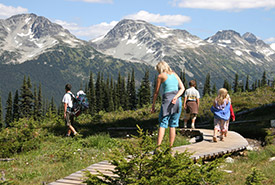6 reasons to move into the forest this fall

Ogilvie sunset on forest, BC (Photo by NCC)
Pack your belongings, health-conscious readers, because the evidence is clear: it’s time to live with nature.
The benefits of spending time in green spaces are well documented. This year, Canada hosted the United Nations’ World Environment Day with the theme "Connecting People to Nature." The day emphasized the health benefits of hiking and protecting nature to enjoy all of its benefits. So, embrace your inner woodland creature, we say, and take a walk through the forest. Here’s why:
1. A longer life
Park yourself in a field and breathe in the fresh scent of greenery like it’s the elixir of life. Because it is. A study of women in the U.S. found that those who lived in areas with more vegetation lived longer than those who don’t. A previous study in The Lancet found that living near green space reduced the health differences between high- and low-income residents, particularly for circulatory diseases such as heart disease. There are hints at why — like less pollution and noise, more incentive to get outside and exercise.

Family hiking near the mountains (Photo courtesy ParticipACTION)
2. A healthier body
Your heart will sing as you wake up to the sound of rustling leaves. That’s because being among the trees can take some of the pressure off your ticker. A study sent a dozen elderly hypertensive patients into the forest for a week, and, for comparison, another dozen into the city. Those who spent the week among the trees, or “forest bathing” as it’s called in Japan, came back with lower blood pressure. In another vote for forest bathing, a 2010 study found that a trip to the forest boosted the immune system for more than a month afterward. The bathers also had more anti-cancer proteins in their body following their trip.
Research in the Netherlands suggests that time spent in green spaces encourages physical activity. Being physically active can help to combat the effects of sedentary lifestyles and health complications related to excess weight, such as diabetes.
3. A healthier mind
Feel the calm envelop you as you unroll your sleeping bag every night. Walking through nature cuts down the tendency to ruminate, shooing away those pesky negative thoughts about yourself that are linked to mental illness, as one study found. After a 90-minute walk in nature, study participants also had less activity in an area of the brain associated with mental illness risk. The time to stake out your patch of forest bliss is now.

Stopping to breathe and take in nature. (Photo by HSBC Bank Canada)
4. More creativity and focus
There is a Picasso waiting to burst out of you, and the mossy ground is ready to bring it forth. Four days in nature helped a group of hikers in one study perform 50 per cent better on a creative problem-solving task. Another study found that natural environments improve people’s ability to focus — even by simply looking at photos of nature.
5. Healthier kids
Got kids? Greenery on school grounds has been associated with better performance in class. Studies have also shown that access to natural environments increases kids' physical activity and helps them unwind and refocus, pointing to a connection with nature that’s hard to measure, but seems to be key to our well-being.
6. The food scene isn’t bad
Ditch the açaí bowl and head to the source: forests around the world are lush with berries, nuts, mushrooms, tubers and protein-rich bugs. That’s a reason in itself to protect these ecosystems, but it also means you can invite your friends to a deep woods dinner party at your new forest home.
Nature and its benefits don’t have to seem so far away. Research suggests that these benefits could even be obtained by visiting your local park. But if you’re up for a bigger adventure, grab your tent, lace up your hiking boots and bask in the peace and healthfulness of a Canadian forest. We’ll see you in the bush!
This post was written by Lindsay Jolivet and Ainslie Butler, Science Borealis’ health, medicine and veterinary science co-editors, and was originally published on Science Borealis’s blog.


